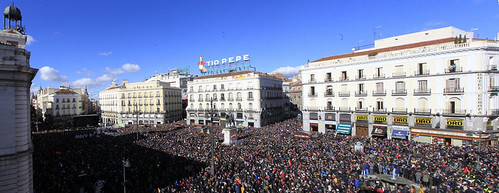Mark Bittman published a very important article last week in
the New York Times, entitled, "What is the Purpose of Society?". Important, because in just a few words he gets to the very heart of political action.
He begins with the most basic problem imaginable: food:
The world of food and agriculture symbolizes most of what’s gone wrong in the United States. But because food is plentiful for most people, and the damage that conventional agriculture does isn’t readily evident to everyone, it’s important that we look deeper, beyond food, to the structure that underlies most decisions: the political economy.(...) Think about it this way: There are two kinds of operating systems, hard and soft. A clock is a hard system. We know what it’s for, we know when it isn’t working, and we know that 10 clock experts would agree on how to fix it — and could do so. Soft systems, like agriculture and economics, are more complex. We don’t all agree on goals, and we don’t agree on whether things are working or in need of repair. For example, is contemporary American agriculture a system for nourishing people and providing a livelihood for farmers? Or is it one for denuding the nation’s topsoil while poisoning land, water, workers and consumers and enriching corporations? Our collective actions would indicate that our principles favor the latter; that has to change. Mark Bittman - New York Times
Toward the end of his article comes a paragraph which, in my opinion could be the political strategy that "connects the dots" between many heterogeneous groups and issues in a way that might finally articulate a serious progressive challenge to today's floundering "conservative revolution".
It’s clear to most everyone, regardless of politics, that the big issues — labor, race, food, immigration, education and so on — must be “fixed,” and that fixing any one of these will help with the others. But this kind of change must begin with an agreement about principles, specifically principles of human rights and well-being rather than principles of making a favorable business climate.
I find this striking because it connects with what
Podemos, the
wildly successful, out of the blue, political movement that is shaking the foundations of Spain's establishment is saying these days.
Podemos originated in the aftermath of the 2011–12 Spanish protests against inequality and corruption. It is a left-wing populist party that seeks to address the problems of inequality, unemployment and economic malaise that followed in the wake of the European debt crisis. (...) Podemos is currently the 2nd largest Spanish party by number of members; it became the 3rd largest party within the first 20 days it allowed membership, with 100,000 signing up in that period, and currently has more than 344,000 members. Wikipedia
Basically their message is that today's problems are not so much a question of "left versus right", but more a question of "up versus down"; "down" being defined as "la gente", a less political buzzword for the people than "el pueblo". This is a demographic smorgasbord that ranges all over the political system but who are united, perhaps unknowingly, in their mutual suffering, the common adversary of all of them being "La casta" (the "caste"), defined as a tiny minority of amazingly wealthy and powerful corporations and individuals who control and manipulate the financial, political and mainstream information systems to their benefit and to the detriment of the vast majority of their fellow citizens.
Finally we are talking about finding a common denominator shared throughout most of the population. Those suffering could include anyone from a civil servant trying to fix the climate or guarantee the purity of what Americans eat or a small, "main street" businessman smothered by the "big boxes", all the way to someone flipping burgers in McDonald's, and every imaginable minority: all could feel oppressed by the system as it stands.
The "casta", then, is the common adversary of all "la gente", the people, that is to say, everybody that is not super-rich and powerful.
In American terms it would sound something like "everybody against the one percent".
What sort of mentality are "we the people" facing? Let's ask Bloomberg:
It's not necessarily natural to act selfishly. Decades of research suggest that humans are hard-wired to reciprocate kind deeds because doing so offers an evolutionary advantage. Yet being at work seems to strip people of a desire to help people. "Organizations are more future-oriented," Pfeffer says. "They emphasize calculation, rather than morality and duty." He and Belmi cite prior research showing how companies have increasingly walked back promised pension benefits, cut retirees' medical insurance benefits, and laid off staff in the absence of financial strains. Even though research suggests the obvious—that being stingy about reciprocation can make employees less productive and more likely to quit—companies still seem to have no qualms about screwing over workers. Bloomberg Business
Clearly then, contrary to much that "they" would like "us" to believe, (understatement warning) the corporate model cannot serve the well being of the community as a whole.
As Mark Bittman says,
Shouldn’t adequate shelter, clothing, food and health care be universal? Isn’t everyone owed a society that works toward guaranteeing the well-being of its citizens? Shouldn’t we prioritize avoiding self-destruction?
You could say it louder perhaps, but I doubt if you could say it more clearly.
DS

